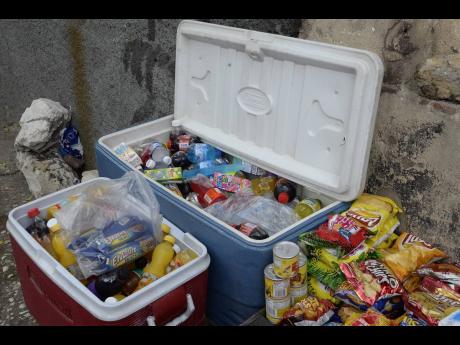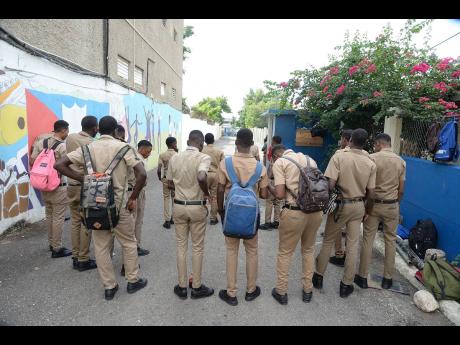Gov’t seeks consensus on legacy education policies
The Ministry of Education and Youth (MOEY) is seeking public buy-in on what it dubs its legacy policies, aimed at bolstering student experience across the island.
But with limited sanctions against some violators, including schools that flout nutritional regulations, there is little guarantee of the efficiency of the initiative.
There are several major policies to be looked at as part of the initiative. These include policies on safe schools, nutrition, higher education, special education, language education, student dress and grooming, and bolstering public educational institutions.
Colin Steer, director of corporate communication at the ministry, said that public consultations have already started with stakeholders in the sector, including board chairs and principals in the first instance, with plans to engage the wider public in the coming months.
At the moment, he said, the focus is primarily on the nutritional and grooming policies, and that the feedback will inform Cabinet approval. The nutritional policy is the furthest along, as it was approved as a Green Paper in May this year.
Operationally, however, getting schools to adhere to the regulations already in place to limit the sale of sugary drinks in the learning institutions is another task.
In May, a Sunday Gleaner probe revealed widespread violation of the sugary drinks ban put in effect in 2018. Some school officials claimed the policy was not clear, while at some institutions, tuck shops still stocked carbonated beverages for sale even while operators acknowledged that they were aware of the ban.
“As we get stakeholder feedback, the ministry will examine those responses to see how best we can incorporate them in the broader framework of the policy,” Steer told The Sunday Gleaner last week.
“The ministry’s emphasis is on getting buy-in by persons by persuasion and collaboration. Hence, there is no major focus on sanctions. That is why we are having several rounds of consultations to outline draft policies and garner better feedback,” he said when questioned about a presumed lack of teeth regarding nutritional regulations in schools.
“Even though the policies might not be at the final stage of implementation, there are already guidelines, and the guidelines would help the schools to put in place certain operational standards,” he explained. “What we are aiming to achieve is the good health of the nation. When you see the results of breaching the guidelines, when you see what happens to people’s health, then you realise that it is in everybody’s interest.”
MAKE UP YOUR MIND
Meanwhile, the education ministry said that its dress and grooming initiative is aimed at helping institutions to establish their own student dress code “that best fits their local situation”.
Common ground on at least these two policies, however, seems far in coming.
Deanroy Bromfield, principal of Excelsior High School, explained that the argument regarding grooming in schools can almost be likened to madness.
“The Government of Jamaica, through its public school system, demands that children wear uniform, and there are some objectives for this; people look alike, so there is no opportunity for tremendous individuality,” he said, noting that this is a good equaliser as it limits distractions pertaining to social class and wealth.
“But, for me, the society is becoming schizophrenic. It’s either you want people in uniform or you don’t want people in uniform. If the decision is to have uniforms, then the schools should be able to determine, through their boards, what that should be. If it is determined that they are abusing the rights of the students, then they should also be taken to book for that,” he said, noting that he has no problems with student hairstyles insofar as they do not pose health risks or are distractions to other students.
Mitzie Harris-Dillion, president of the National Parent-Teacher Association of Jamaica (NPTAJ), said her only concern about grooming is “some schools’ ability to implement and operationalise a grooming policy that may conflict or support administrators’ personal beliefs”.
She cited one school where its uniform was changed overnight.
“One school asked all its lower school students to wear ties. Now, we at the NPTAJ need to know who gave the authorisation. We have written the ministry about it and they have responded to say they will investigate,” she said. “It is about affordability. Persons are scrambling to afford books; and in addition, they are now being asked to buy a tie for $3,000. And before that, the tie was for $1,000 and the quality is not good.
“So we are waiting to hear what they say and we are asking the school to rescind,” she said.
AFFORDABILITY A REAL CONCERN
Harris-Dillion cited the nutritional policy as another problematic issue for schools and parents.
“We do support proper nutrition in schools. The ministry’s mission is to reduce the level of sugar consumption. The real challenge that parents have is affordability, which has been eroded by the pandemic, the loss of jobs ... . It’s back to school and some parents can hardly find $500 to buy food.
“If the Government wants healthier foods, then what provisions will they put in place to mitigate some of the cost passed on to parents, families and children? $1,000 can barely buy you a box food and a drink. Before that, $1,000 used to serve for a week,” Harris-Dillion reasoned.
“It has to be a multipronged approach. If you tell the school to get the healthier products and when they invest and get those healthy products, how will the children and parents afford those? If the schools buy these healthier products, which are most times more expensive, they are going to sit on the shelf. So, the MOEY must be able to subsidise these things.”
Bromfield said Excelsior has drastically reduced the quantity of sugary drinks being sold on the school compound. However, he said there must be contemplation about Jamaica’s culture.
“It is very difficult to sell the idea of no sweet drinks to students. No matter how hard we try to cut down in the schools, students will simply save their money. I suspect that if the measures get tougher, then the students will only seek to purchase the sugary drinks elsewhere,” he theorised.




